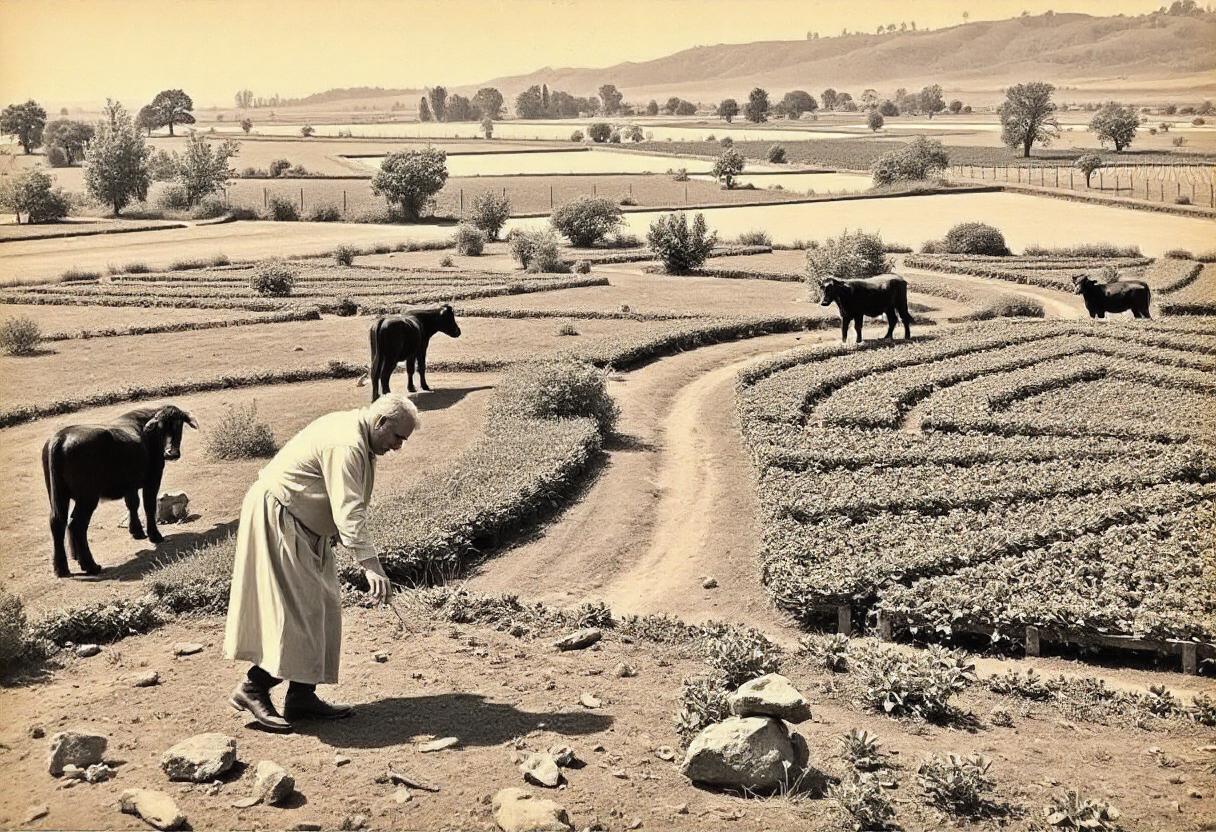
The history of agriculture spans thousands of years, tracing the development of human societies from early foragers to modern agricultural economies. This evolution has profoundly shaped civilizations, economies, and landscapes.
Early Agriculture
Agriculture began around 10,000 BCE during the Neolithic Revolution, marking the transition from nomadic hunter-gatherer societies to settled farming communities. Early agriculture emerged independently in several regions, including:
- The Fertile Crescent: Often cited as the cradle of agriculture, this region in the Middle East saw the domestication of wheat, barley, and legumes, along with the introduction of animal husbandry with sheep, goats, and cattle.
- China: The Yangtze and Yellow River valleys were early centers of rice and millet cultivation. The domestication of pigs and chickens also occurred in this region.
- Mesoamerica: In present-day Mexico and Central America, early agriculture involved the domestication of maize (corn), beans, and squash, which formed the basis of complex civilizations like the Maya and Aztecs.
- The Andes: In South America, ancient cultures such as the Inca cultivated potatoes, quinoa, and maize, and developed terraced farming techniques adapted to mountainous terrain.
Development of Agricultural Techniques
As societies advanced, agricultural practices became more sophisticated:
- Plowing and Irrigation: The invention of the plow around 3,000 BCE in Mesopotamia revolutionized crop cultivation by allowing for more efficient soil tillage. Concurrently, the development of irrigation systems, such as canals and dikes, enabled the cultivation of larger areas of land and supported urban growth.
- Crop Rotation and Selective Breeding: By the Middle Ages, European farmers practiced crop rotation to maintain soil fertility and reduce pest problems. Selective breeding of plants and animals began to improve yields and livestock quality.
The Agricultural Revolution
The Agricultural Revolution, which took place from the 16th to the 19th centuries, brought transformative changes:
- Enclosure Movement: In England, the enclosure movement involved the consolidation of common lands into private farms, leading to increased agricultural productivity and efficiency. This shift also contributed to the growth of larger, commercial farms.
- Advancements in Machinery: The invention of new agricultural machinery, such as the seed drill by Jethro Tull and the mechanical reaper by Cyrus McCormick, improved planting and harvesting efficiency. These innovations supported the expansion of farming and the development of commercial agriculture.
20th Century Developments
The 20th century saw significant changes in agriculture driven by technological advancements and global events:
- Green Revolution: Beginning in the 1940s, the Green Revolution introduced high-yielding crop varieties, chemical fertilizers, pesticides, and advanced irrigation techniques. These innovations led to substantial increases in food production, particularly in developing countries.
- Mechanization and Industrialization: The widespread adoption of tractors, combine harvesters, and other machinery transformed farming practices, making large-scale, industrial agriculture possible. This period also saw the rise of agribusinesses and global food supply chains.
Contemporary Agriculture
Today, agriculture continues to evolve with ongoing advancements and challenges:
- Precision Agriculture: Modern technologies such as GPS, drones, and data analytics enable farmers to monitor crops and optimize inputs with unprecedented precision, improving efficiency and reducing environmental impact.
- Sustainable Practices: There is a growing emphasis on sustainability, with practices like organic farming, agroecology, and conservation tillage aimed at minimizing environmental impact and promoting soil health.
- Biotechnology: Advances in biotechnology, including genetically modified organisms (GMOs) and gene editing, have introduced new methods for improving crop resistance and yields.
- Climate Change: Agriculture faces significant challenges from climate change, including shifting weather patterns, water scarcity, and soil degradation. Adaptation strategies and innovations are crucial for maintaining food security and resilience.
The history of agriculture reflects humanity’s ingenuity and adaptability, shaping the development of societies and their interactions with the environment. As agriculture continues to evolve, it remains a critical component of global food systems, economies, and ecosystems.